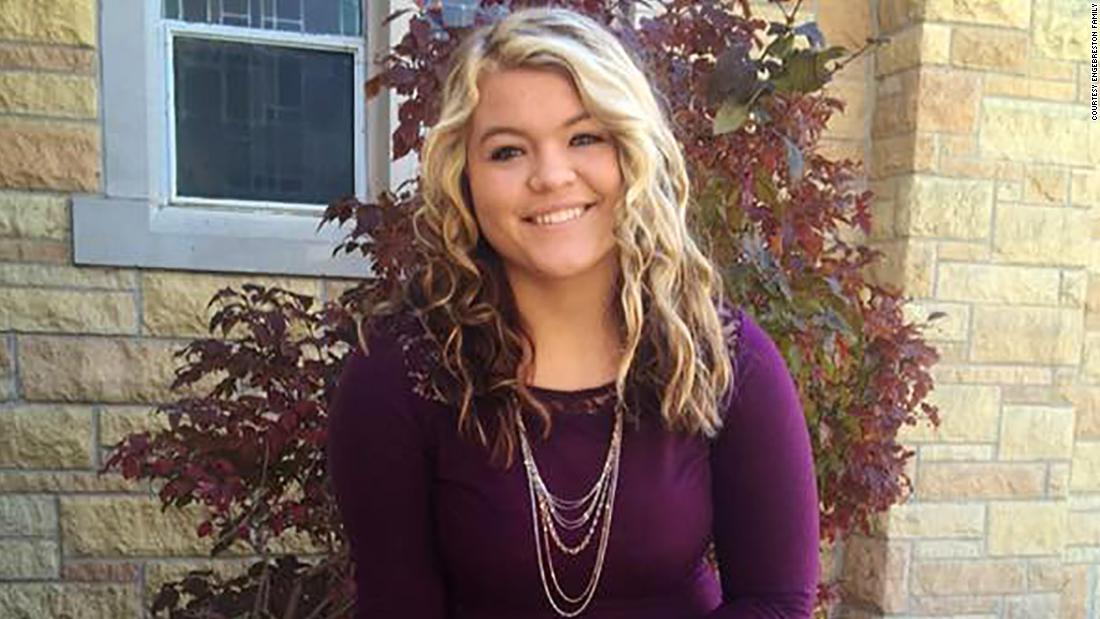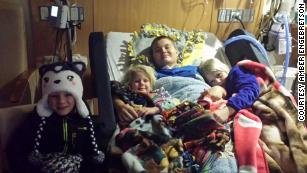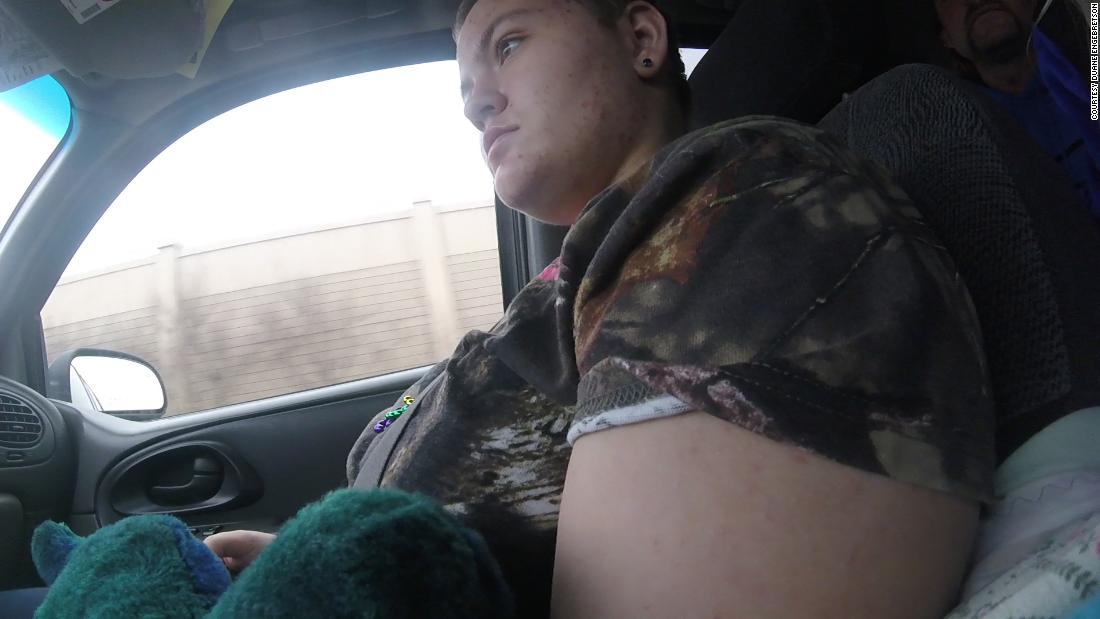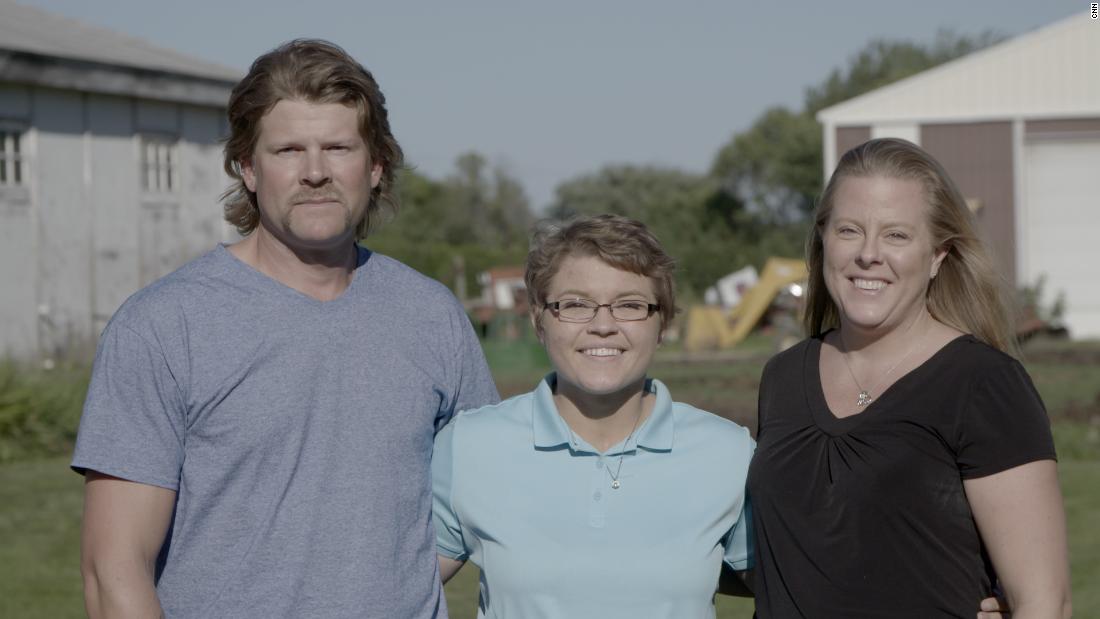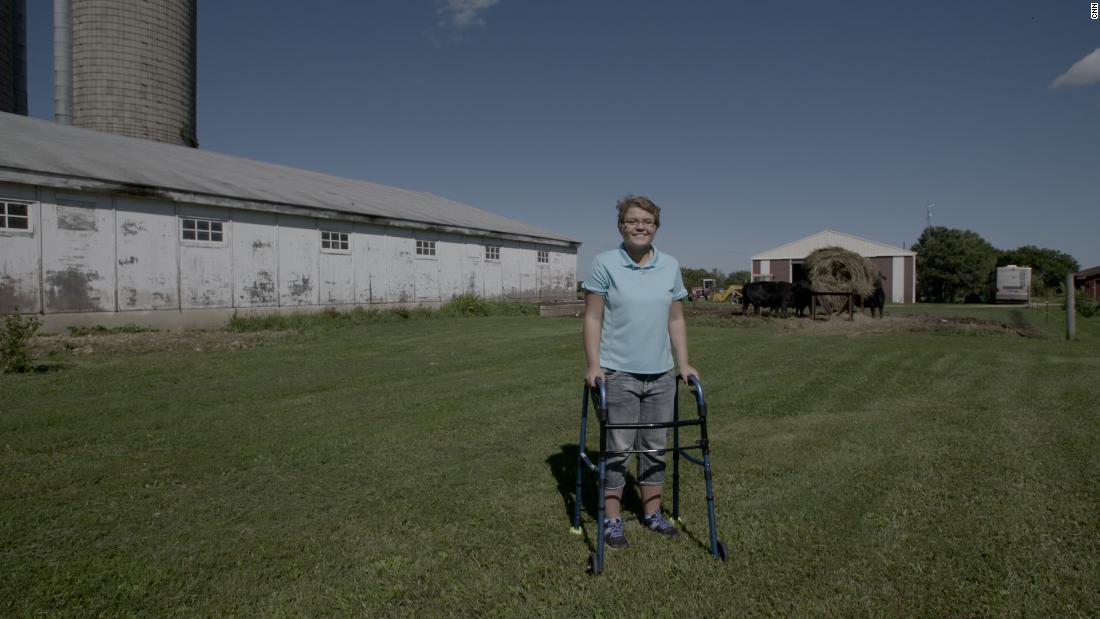"Get out of here, Amber," he tells his wife. "Go, go, go, go, go, go!"
The car drives away from Mayo.
"It was like the biggest weight off my shoulders," she said.
"We have a patient abduction," the caller said.
An officer arrived on the scene 20 minutes later.
A Mayo social worker told him that Alyssa "cannot make decisions for herself" and that her mother couldn't care for her "because Amber has mental health issues."
The social worker also told police she "understood there was no formal diagnosis" for Amber.
Amber told CNN she has no history of mental illness and took offense to the social worker making such an unqualified pronouncement.
![Alyssa Gilderhus as a child with her grandmother Betty Stalheim, mother, Amber Engebretson, and younger siblings.]()
Alyssa Gilderhus as a child with her grandmother Betty Stalheim, mother, Amber Engebretson, and younger siblings.
"It's absolutely absurd," Amber said. "She said it to the police department. She has no reasoning. She has no justification."
The social worker told the police she'd been working with adult protection services in two Minnesota counties "trying to get emergency guardianship" but had been unable to get court orders to do so.
An Olmsted County Adult Protective Services official told police that "Mayo was requesting [assistance] in gaining guardianship of Alyssa because they were concerned for the mother's mental health and the medical decisions that were being made for Alyssa."
But something didn't quite make sense to John Sherwin, captain of investigations for the Rochester Police Department.
If Alyssa couldn't make decisions for herself, as the social worker had said, and if she needed a legal guardian appointed for her, then who had been making decisions for her while she was in the hospital?
When police asked that question of Mayo staffers, Sherwin said, they replied that Alyssa had been making her own medical decisions.
"When doctors were consulting with her in regards to her medical care, they weren't doing so through a guardian or someone that had been appointed by the courts. It was in direct contact with the patient," Sherwin said.
He said it became clear to investigators that Alyssa "in fact could make decisions on her own" -- including the decision to leave the hospital against medical advice.
"There was no abduction. This was done under her own will," he said. "You had a patient that left the hospital under their own planning."
Though satisfied that Alyssa was capable of making her own decisions, Sherwin still was concerned about her health.
"What was relayed to us [by Mayo staff] was that the patient was in danger of dying if they were not in the hospital," Sherwin said.
Mayo sent the police an order for a 72-hour hold, which allows police to admit someone to a hospital emergency room against their will if they're a danger to themselves.
But first, the police had to find Alyssa.
Police search for Alyssa
Alyssa and her parents were on the run. They weren't answering their cell phones, and they weren't at home, either.
They later told CNN they figured the police would bring Alyssa to a hospital, and given the large number of Mayo facilities in Minnesota, there was a good chance that hospital would be a Mayo hospital.
"We felt that if [Mayo] got their hands on her, they would latch on and we wouldn't get her back again," Duane said.
![Alyssa moments after she escaped from the Mayo Clinic with the help of her parents.]()
Alyssa moments after she escaped from the Mayo Clinic with the help of her parents.
Unable to find the family, the police pinged their cell phones. This pointed them to an Applebee's restaurant in Mankato, Minnesota, about 85 miles west of Rochester. Officers searched the restaurant and a nearby Five Guys but couldn't find Alyssa, according to a Mankato police report.
It turned out the ping was a bit off: The family was down the street at Walmart, purchasing a wheelchair, a walker and a syringe for Alyssa's feeding tube, which Duane says he'd been trained to use. They then checked into a nearby hotel.
While at the hotel, the family received a phone call from a Martin County sheriff's deputy. They say they told the deputy that their daughter was doing well, and they planned to bring her to a doctor the next day to get her checked.
The deputy said that wasn't good enough. He told them they were on their way to them, according to the family.
Alyssa and her parents scrambled and left the hotel.
It was now almost 9 p.m., and nearly five hours had passed since they'd left Mayo. The family was on the road with three police agencies -- Rochester, Mankato and Martin County -- on their heels.
As Alyssa's stepfather drove down the highway, a sheriff's deputy called, urging them to bring their daughter to a hospital right away. They told him they'd bring her to a hospital in Jackson, about 75 miles away.
But then, the family reconsidered. They'd chosen Jackson because it had a hospital that wasn't owned by Mayo. But they feared that the doctors there might transfer her to a Mayo facility.
After the calls from police, Alyssa's parents figured out that their phones were being pinged and took the batteries out.
They got off the highway and drove on gravel roads without a map.
"I just kept heading west. I knew I would run into South Dakota sooner or later," he said.
'This kid is in danger'
The next afternoon, March 1, one of Alyssa's doctors, a pediatric rehabilitation specialist at Mayo, spoke on the phone with Sherry Bush-Seim, a Rochester police investigator.
The doctor warned that Alyssa was in grave danger.
"The longer she's away, the higher likelihood that she's gonna get very, very sick," the physician said, according to a transcript of the conversation that police provided to CNN.
The day Alyssa left Mayo, that doctor and a colleague had written a discharge note.
"Alyssa's medical condition, medical status, cognition, and physical impairments require an ongoing inpatient level of medical care," the doctors wrote. "She was not medically or functionally safe to leave the hospital at the time of her removal from the hospital by her stepfather."
Alyssa was at risk for pneumonia, malnourishment, dehydration, aspiration, infection and falling, according to the note. She didn't have her medications with her, and her parents weren't trained on how to use her feeding tube, according to the discharge summary.
The doctor said Alyssa was probably "a ways from here by now" and requested a wider-scale search.
"[It's] incredibly frustrating that something isn't out nationally given that [this] family may be hopping from doctor to doctor," the doctor said.
"We wouldn't do that nationally," Bush-Seim responded. "That wouldn't be done."
Without a national search, the doctor said, "we're not gonna find her."
Bush-Seim assured the physician that the Rochester police had "done everything they possibly could to find her."
"There's got to be something more. This kid is in danger," Alyssa's doctor responded.
The police back off
But other doctors disagreed with the Mayo physician.
Less than 12 hours after leaving Mayo, she and her parents arrived at the emergency room for Sanford Medical Center in Sioux Falls, a teaching hospital for the University of South Dakota.
They explained to Sanford doctors that she'd had an aneurysm and left Mayo against medical advice, according to medical records from that emergency room visit.
The Sanford doctors disagreed with the Mayo doctors on two crucial points.
Although Mayo doctors had insisted that Alyssa needed to be in the hospital, the Sanford doctors came to the opposite conclusion: They prescribed Alyssa medications, gave instructions for her to follow up with a doctor and told her she could go home.
Mayo had determined that Alyssa lacked the mental capacity to make her own decisions. The Sanford doctors again came to the opposite conclusion: They allowed her to make her own decisions and sign her own forms consenting to treatment.
When police learned that a hospital had cleared Alyssa to go home, they stepped aside.
"If a doctor at another facility says she's fine and comes up with a second opinion, that kind of takes the law out of it," said Chris Vasvick, a Martin County sheriff's deputy. "That's one doctor's opinion against another, and that doesn't have anything to do with law enforcement at all."
Sherwin, the Rochester detective, agreed.
"We didn't have any reason for the police to intervene," Sherwin said.
He added that Alyssa and her parents had done nothing illegal. No charges were filed against them.
"As parents, they were probably thinking that they were acting on her best interest. I think the same could be said for the doctors and staff at Mayo Clinic. I think that they also felt they were acting on her best interest," Sherwin said.
A few days after her visit to the Sanford emergency room, Alyssa and her parents went home.
A letter from Mayo was waiting for them, thanking Duane for getting in touch with the patient experience office.
The family found it ironic, given that it was dated March 1, the day after Alyssa left the hospital.
A few days later, another letter arrived from an administrator at Mayo, saying that it would not treat Alyssa or her parents.
"We have made this decision because of your actions which demonstrate a lack of trust and confidence in Mayo," the administrator wrote.
On Facebook, Amber shared that Alyssa's health was improving.
"This kid amazes me every day!! And we all could not be more proud!!" she wrote.
![Alyssa Gilderhus with her parents months after they helped her escape from the Mayo Clinic.]()
Alyssa Gilderhus with her parents months after they helped her escape from the Mayo Clinic.
'Hospitals aren't prisons'
To understand the legal and ethical issues in Alyssa's case, CNN showed experts key documents, including law enforcement reports; a transcript of portions of CNN's interview with Sherwin, the detective at the Rochester Police Department; and summaries of her care written by doctors at Mayo and Sanford.
The experts emphasized that those documents don't tell the whole story; only a thorough reading of her full medical records and interviews with Mayo staff would provide a complete picture.
"You're only hearing one side," cautioned Dr. Chris Feudtner, a professor of pediatrics, medical ethics and health policy at the University of Pennsylvania Perelman School of Medicine.
After reviewing the documents, the experts wondered why Mayo did not allow Alyssa, who was 18 and legally an adult, to leave the hospital when she made clear that she wanted to be transferred, according to the family.
They said that typically, adult patients have the right to leave the hospital against medical advice, and they can leave without signing any paperwork.
"Hospitals aren't prisons. They can't hold you there against your will," said George Annas, an attorney and director of the Center for Health Law, Ethics & Human Rights at the Boston University School of Public Health.
But Alyssa's doctors say she wasn't a typical patient.
"Due to the severity of her brain injury, she does not have the capacity to make medical decisions," her doctors wrote in her records after she'd left the hospital.
In that report, the doctors specified that assessments in the last week of her hospital stay showed that she lacked "the capacity to decide to sign releases of information, make pain medication dose changes, and make disposition decisions. This includes signing paperwork agreeing to leave the hospital against medical advice."
That hadn't jibed with the captain of investigations for the Rochester police. Sherwin said it didn't make sense that Mayo staffers told police Alyssa had been making her own decisions, yet in the discharge note, they stated she wasn't capable of making her own decisions.
It didn't jibe with the experts, either.
"They can't eat their cake and have it, too," said Feudtner, the medical ethicist at the University of Pennsylvania.
Even if Alyssa truly did lack the capacity to make her own medical decisions, the experts had questions about Mayo's efforts to obtain emergency guardianship for Alyssa.
Brian Smith, the Rochester police officer who responded to Mayo's 911 call the day Alyssa left Mayo, said a Mayo social worker told him she'd been working for a week or two to get a Minnesota county to take guardianship over Alyssa.
"The county would have guardianship over her and would make decisions for her," he told CNN.
If that happened, Alyssa most likely would have stayed at Mayo, as she was already receiving treatment there, Smith said.
Bush-Seim, the Rochester police investigator, spoke with an official at one of the county adult protection agencies. She said it was also her understanding that Mayo wanted the county to take guardianship of Alyssa, or that perhaps Mayo itself wanted to directly take guardianship of her.
The legal experts said they were not surprised that Mayo was unable to get court orders for such guardianship arrangements. It's a drastic and highly unusual step for a county or a hospital to take guardianship over a patient, they said, rather than have a family member become the patient's surrogate decision-maker.
Robert McLeod, a Minneapolis attorney who helped the state legislature draft its guardianship laws, did not review the documents pertaining to Alyssa, as he did not want to comment on any specific case.
He said that before appointing a county or a hospital as a legal guardian, a judge would ask why a family member or close friend hadn't been selected as a surrogate.
"From my 25 years of experience, a judge is going to say, 'why isn't the family the first and best choice here?' and it had better be a good reason," said McLeod, an adjunct professor at the Mitchell Hamline School of Law in Saint Paul, Minnesota.
Other experts agreed.
Saver, the professor at the University of North Carolina School of Law, said that in his four years working in the general counsel's office at the University of Chicago Hospitals and Health System, he doesn't once remember the hospital seeking guardianship for a patient who had a responsible relative or friend who could act as surrogates.
"It's thought of as kind of the atom bomb remedy," Saver said. "I'm a little flummoxed what to make of this. They had family members on the scene to look to."
Alyssa said her biological father, Jason Gilderhus, told her that Mayo asked him to become her guardian. He did not become her guardian and did not respond to CNN's attempts to reach him.
Even if Mayo had concerns about Alyssa's mother and her biological father didn't work out, there were other friends and relatives to turn to, such as her stepfather, grandmother, great-grandmother, aunt or boyfriend's mother.
"It's so baffling why they didn't try to designate a surrogate before trying to get a guardian," added Dr. R. Gregory Cochran, a physician and lawyer and associate director of the Health Policy and Law program at the University of California, Hastings College of the Law in San Francisco.
Another feature of Alyssa's case also surprised the experts.
Caplan, the NYU bioethicist, said that in complicated and contentious cases like this one, doctors typically reach out to their hospital's ethics committee for help.
An ethics committee would listen to the doctors, other staff members, the patient and the family to try to resolve the conflict.
The family says no one ever mentioned an ethics committee to them, and there's no mention of an ethics committee consult in the discharge summary in Alyssa's medical records.
Annas, the lawyer at Boston University, agreed that an ethics committee consultation would have been an obvious and important way to help resolve the dispute before it spun out of control.
"Disputes between families and hospital staff happen all the time, and they can either escalate or de-escalate," Annas said. "An ethics consult can help sort out the issues so they de-escalate."
The experts said they were disappointed that in Alyssa's case, the conflict escalated.
"I was shocked to see that parents had to pull a fast one to get their daughter out of the hospital," said Cochran, of the University of California.
"I felt sad," said Feudtner, the ethicist at the University of Pennsylvania. "Viewed in its entirety, this did not go well for anybody who was involved."
Gaalswyk, the former Mayo board member, said he hopes the hospital learns something.
"I hope that someone somewhere will look at what happened in this unfortunate case and improve both our Mayo employee's actions and patient systems so that it not need happen again to any other patient at Mayo," he wrote a Mayo vice president after Alyssa left the hospital. "The situation need not get out of hand like it did."
Being 'held hostage in an American hospital'
While the details of Alyssa's case are extraordinary -- the Grandma Betty trick, the escape from the hospital with police on their heels -- the core of her story is not uncommon in many ways, according to patient advocates.
Dr. Julia Hallisy, founder of the Empowered Patient Coalition, says families often tell her that a hospital won't allow their loved one to transfer to another facility. Often, they're afraid to say anything publicly or on social media.
"You sound like a crazy person -- that your family member was held hostage in an American hospital," she said. "People can't believe that would happen. It's like the stuff of a science fiction story."
Kristen Spyker said it happened to her family.
When Spyker's son was born with a rare heart defect, she says she told doctors at the Ohio hospital where he was born that she wanted him to have a surgical repair at a hospital with a larger pediatric heart program.
She said the heart surgeon at the first hospital refused to send her son's medical records to other hospitals. She also says a surgeon resisted her efforts to transfer her newborn son to another hospital to get a second opinion on what surgery he should have for a rare heart defect.
"The surgeon said, 'This is my patient. This is my show. I'm the boss, and I say what happens,' " she said.
She said a social worker, accompanied by hospital security guards, then came into her son's hospital room and said she was worried that Spyker had postpartum depression that was affecting her ability to make decisions for her son's care.
Spyker said the hospital discharged her son only after she threatened legal action.
Her son then had a successful procedure at another hospital -- a different procedure than the one recommended by the first doctor.
When she told her story on Facebook, Spyker said, other parents shared similar stories.
"It was parent after parent after parent saying 'this happened to us,'" she said. "They had been so embarrassed to talk about it, but they felt freer when I said it happened to us."
Spyker was one of several people who spoke with Alyssa's parents last year while their daughter was at Mayo.
In a statement to CNN, the American Hospital Association addressed conflicts between families and hospitals.
"Communication between physicians and patients is extremely important in working to identify the best treatment," said Dr. Jay Bhatt, senior vice president and chief medical officer of the organization.
"Each patient is unique. It is for this reason that the majority of hospitals have patient advocates on staff to help patients and families navigate the care process. Hospitals recognize that patients are critical members of any care team and many are employing new strategies to ensure their voice and perspective is heard and accounted for."
When hospitals and families get into intense conflict, Hallisy, a dentist who practices in San Francisco, says human emotions can run amok. She says she saw it happen when her daughter, Katherine, was being treated for cancer.
"People think that doctors are immune to petty disagreements, but they're human beings, and sometimes ego and primitive emotions take over," she said.
She said that in Alyssa's case, she wonders whether a sensitive hospital staffer, perhaps a social worker, could have prevented the situation from becoming as contentious as it did.
She thinks back to her daughter, who died at age 10. She remembers the sadness and fear of having a very sick child, as well as the stress of taking care of her two other children and keeping her dental practice afloat while her daughter was in and out of the hospital.
She thinks about how Alyssa was near death and how her parents had five younger children 130 miles away, as well as farms and a family business to run.
"They were under incredible stress," Hallisy said. "They'd almost lost a child, and they had other responsibilities, too. You would think that someone at Mayo would be trained to see that."
The prom queen graduates
More than a year after leaving the Mayo Clinic, Alyssa, now 20, has belied her "grim prognosis."
![The students of Martin County West High School crowned Alyssa Gilderhus prom queen.]()
The students of Martin County West High School crowned Alyssa Gilderhus prom queen.
Last year, she graduated from Martin County West High School, receiving a standing ovation from her class. She stayed out all night at her senior prom, where her classmates voted her prom queen. The local chapter of Future Farmers of America gave her the Star Farmer award.
Her feeding tube came out a few months after she left Mayo, and she can eat and speak normally now. She can walk on her own without any assistance. Last summer, she presented her fantail pigeons at the Minnesota State Fair and competed in the poultry princess competition.
She finished up her physical and speech therapy in March, about a year after leaving Mayo. She'll be a freshman at Southwest Minnesota State University in September.
![Alyssa Gilderhus on her family's farm in Sherburn, Minnesota.]()
Alyssa Gilderhus on her family's farm in Sherburn, Minnesota.
Alyssa has not filed a lawsuit, but has engaged Martin, the lawyer who is also representing the Pelletier family.
Alyssa and her parents say they haven't recovered emotionally from what happened at Mayo. They say they still sometimes wake up in the middle of the night, panicked about what would have happened if they hadn't snuck her out of the hospital.
"I think she would be [at the hospital] and nobody would be able to see her," her stepfather said.
They say Mayo still hasn't given them an explanation for why it was trying to arrange guardianship for Alyssa.
They think Mayo was trying to get guardianship in retaliation for questioning the staff, especially a senior physician.
"I think that the doctor I made mad wanted to make sure that I paid for it no matter what," her mother said.
She's told that's a pretty hefty accusation.
"We stand by it 100 percent," her stepfather said.
Full Article & Source:




















